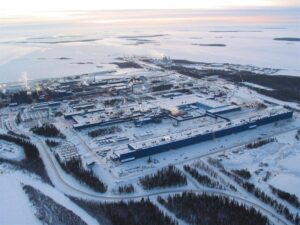Outokumpu acquires 20% share of Envigas

The company said it has ambitious sustainability targets and is constantly looking for options to further decarbonise the industry and the company’s stainless steel production.
Switching from the use of fossil raw materials to biomass-based alternatives is a key driver in emission reduction, it added.
Value-chain integration is a key priority in Outokumpu's strategy to strengthen the supply chain of sustainable raw materials for the future, according to the firm.
This motivated its decision to become a shareholder in Envigas, with an ownership share of 20%.
Biocoke
Outokumpu produces ferrochrome on the same site in Tornio, Finland as stainless steel. The carbon footprint of Outokumpu ferrochrome is 67% smaller compared to the industry average, according to the organisation. A further decrease is targeted with the transfer to using biomass-based reductants like biocoke.
“The move towards using new types of biomass-based raw materials is a concrete step forward to significantly reduce our direct emissions, which account for approximately 25% of Outokumpu’s total emissions.
"We have successfully carried out production tests with biocarbon and biocoke and look forward to increasing their usage in the future,” said Timo Huhtala, general manager responsible for Outokumpu’s biocoke initiative.
Biocarbon
With a production plant based in Skellefteå, Sweden, Envigas is the first large-scale producer of high quality biocarbon in the Nordics with a focus on products for the steel industry to help in the shift towards zero emissions, according to the company.
Envigas aims to expand its production capacity by 25,000 tonnes in the first scale up phase by end of 2026 and Outokumpu has agreed to invest €9.9 million into the company.
With the investment, Outokumpu secures a right to 50% of Envigas’ production.
“Collaboration and strong offtake commitments are key components in the scaling up of high quality biocarbon production," said Lars-Gunnar Almryd, Envigas CEO.
"Envigas has an ambitious growth agenda, and we are excited to partner with Outokumpu, as a leading industrial actor with high sustainability targets.
"The partnership will be mutually beneficial, reduce risks and increase speed in the important work to reduce CO2-emissions.”
Decarbonisation
Outokumpu’s climate target is to reduce carbon dioxide emissions by 42% by 2030 from the base year of 2016, in accordance with the Science-Based Targets initiative’s 1.5 degree climate target, said the company.
“To decarbonise our stainless steel requires efforts in reducing emission across all scopes. Utilisation of biomass-based raw materials represents an exciting new chapter in our stainless steel production," said Huhtala.
"It also supports the circular economy since valuable, sustainably-sourced, forest and wood industry side streams, currently burned for low-efficient energy purposes, can be utilised to create new types of raw materials for other industries.”
Outokumpu is further working on a feasibility study regarding a possible investment into a biocoke production facility of its own in the future.


























